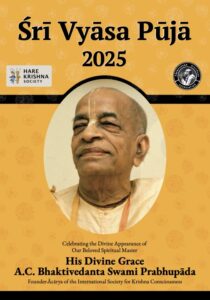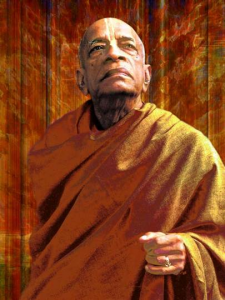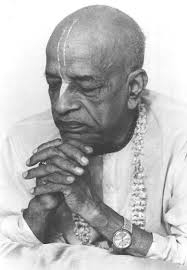Adi 17.31–“One who thinks himself lower than the grass, who is more tolerant than a tree, and who does not expect personal honor yet is always prepared to give all respect to others can very easily always chant the holy name of the Lord.”
Adi 17.32–Raising my hands, I declare, “Everyone please hear me! String this verse on the thread of the holy name and wear it on your neck for continuous remembrance.”
Adi 17.33–One must strictly follow the principles given by Lord Caitanya Mahāprabhu in this verse. If one simply follows in the footsteps of Lord Caitanya and the Gosvāmīs, certainly he will achieve the ultimate goal of life, the lotus feet of Śrī Kṛṣṇa.
Adi 17.34–Śrī Caitanya Mahāprabhu regularly led congregational chanting of the Hare Kṛṣṇa mahā-mantra in the house of Śrīvāsa Ṭhākura every night for one full year.
Adi 17.35–This ecstatic chanting was performed with the doors closed so that nonbelievers who came to make fun could not gain entrance.
PURPORT-Chanting of the Hare Kṛṣṇa mahā-mantra is open to everyone, but sometimes nonbelievers come to disturb the ceremony of chanting. It is indicated herein that under such circumstances the temple doors should be closed. Only bona fide chanters should be admitted; others should not. But when there is large-scale congregational chanting of the Hare Kṛṣṇa mahā-mantra, we keep our temples for everyone to join, and by the grace of Lord Caitanya Mahāprabhu this policy has given good results.
Adi 17.36–Thus the nonbelievers almost burned to ashes and died in envy. To retaliate, they planned various ways to give trouble to Śrīvāsa Ṭhākura.
Adi 17.37–One night while kīrtana was going on inside Śrīvāsa Ṭhākura’s house, a brāhmaṇa named Gopāla Cāpāla, the chief of the nonbelievers, who was talkative and very rough in his speech, placed all the paraphernalia for worshiping the goddess Durgā outside Śrīvāsa Ṭhākura’s door.
PURPORT-This brāhmaṇa, Gopāla Cāpāla, wanted to defame Śrīvāsa Ṭhākura by proving that he was actually a śākta, or a worshiper of Bhavānī, the goddess Durgā, but was externally posing as a Vaiṣṇava. In Bengal there is perpetual competition between the devotees of Goddess Kālī and the devotees of Lord Kṛṣṇa. Generally Bengalis, especially those who are meat-eaters and drunkards, are very much attached to worshiping the goddesses Durgā, Kālī, Śītalā and Caṇḍī. Such devotees, who are known as śāktas, or worshipers of the śakti-tattva, are always envious of Vaiṣṇavas. Since Śrīvāsa Ṭhākura was a well-known and respected Vaiṣṇava in Navadvīpa, Gopāla Cāpāla wanted to reduce his prestige by bringing him down to the platform of the śāktas. Therefore outside Śrīvāsa Ṭhākura’s door he placed various paraphernalia for worshiping Bhavānī, the wife of Lord Śiva, such as a red flower, a plantain leaf, a pot of wine, and reddish sandalwood paste. In the morning, when Śrīvāsa Ṭhākura saw all this paraphernalia in front of his door, he called for the respectable gentlemen of the neighborhood and showed them that at night he was worshiping Bhavānī. Very much sorry, these gentlemen called for a sweeper to cleanse the place and purify it by sprinkling water and cow dung there. This incident concerning Gopāla Cāpāla is not mentioned in the Caitanya-bhāgavata.
Adi 17.44-They called for a sweeper [hāḍi], who threw all the items of worship far away and cleansed the place by mopping it with a mixture of water and cow dung.
PURPORT-The men in Vedic society who engage in public sanitary activities like picking up stool and sweeping the street are called hāḍis. Sometimes they are untouchable, especially when engaged in their profession, yet such hāḍis also have the right to become devotees. This is established by Śrī Bhagavad-gītā (9.32), where the Lord declares:”O son of Pṛthā, those who take shelter in Me, though they be of lower birth-women, vaiśyas [ merchants], as well as śūdras [workers]-can approach the supreme destination.”There are many untouchables of the lower caste in India, but according to Vaiṣṇava principles everyone is welcome to accept this Kṛṣṇa consciousness movement on the spiritual platform of life and thus be freed from trouble. Equality or fraternity on the material platform is impossible.When Lord Caitanya declares, tṛṇād api su-nīcena taror iva sahiṣṇunā, He indicates that one must be above the material conception of life. When one thoroughly understands that he is not the material body but a spiritual soul, he is even humbler than a man of the lower castes, for he is spiritually elevated. Such humility, in which one thinks himself lower than the grass, is called su-nīcatva, and being more tolerant than a tree is called sahiṣṇutva, forbearance. Being situated in devotional service, not caring for the material conception of life, is called amānitva, indifference to material respect; yet a devotee thus situated is called māna-da, for he is prepared to give honor to others without hesitation.
Adi 17.45–After three days, leprosy attacked Gopāla Cāpāla, and blood oozed from sores all over his body.
Adi 17.46-Incessantly covered with germs and insects biting him all over his body, Gopāla Cāpāla felt unbearable pain. His entire body burned in distress.
Adi 17.49-“As an incarnation of God, You are delivering so many fallen souls. I am also a greatly unhappy fallen soul. Kindly deliver me by Your mercy.”
Adi 17.50-Hearing this, Caitanya Mahāprabhu appeared greatly angry, and in that angry mood He spoke some words chastising him.
Adi 17.51–“O sinful person, envious of pure devotees, I shall not deliver you! Rather, I shall have you bitten by these germs for many millions of years.
PURPORT-We should note herein that all our sufferings in this material world, especially from disease, are due to our past sinful activities. And of all sinful activities, actions directed against a pure devotee out of sheer envy are considered extremely severe. Śrī Caitanya Mahāprabhu wanted Gopāla Cāpāla to understand the cause of his suffering. Any person who disturbs a pure devotee engaged in broadcasting the holy name of the Lord is certainly punished like Gopāla Cāpāla. This is the instruction of Śrī Caitanya Mahāprabhu. As we shall see, one who offends a pure devotee can never satisfy Caitanya Mahāprabhu unless and until he sincerely regrets his offense and thus rectifies it.
Adi 17.52–“You have made Śrīvāsa Ṭhākura appear to have been worshiping the goddess Bhavānī. Simply for this offense, you will have to fall down into hellish life for ten million births.
Some Conclusions—the very first offense to chanting is—to blaspheme or unnecessarily criticize the devotees of the Lord.




